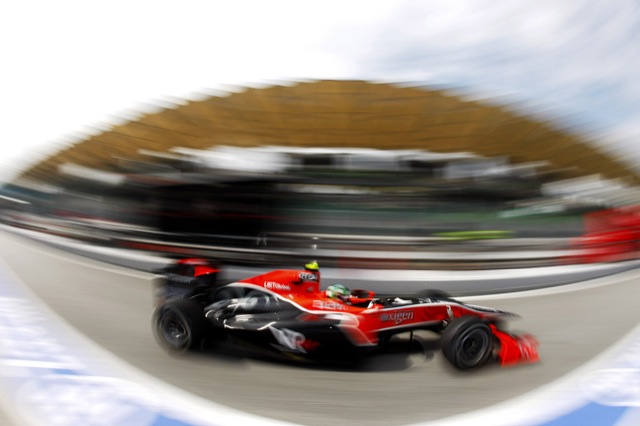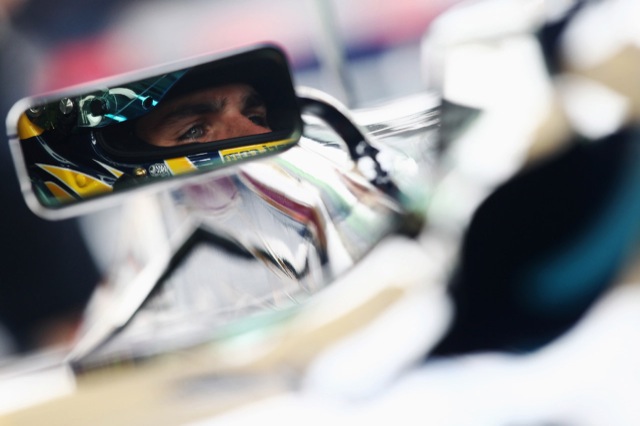BMW are making for interesting viewing at the moment, the former Sauber team looking to be on the verge of their maiden win and thinking slightly longer-term, on the verge of their maiden constructor’s title. But this evening, while sitting in The Blogger’s Dog, it struck me that the team have very similar experience to another on the grid. The other team has gone that bit further and taken a victorious drink of Mumm, but in all honesty, that moment is all but a distant memory among the torrid battles with a woefully uncompetitive car. The other team is of course Honda, and the paths each have followed are quite interesting.
Honda have competed in Formula One before, but it was way back in the sixties and therefore has little relevance to today’s championship. While they enjoyed moderate success in the past, the current structure of the Honda F1 squad is an entirely different beast to the current. You could argue that Ferrari’s past bears some resemblance to their current form simply because they remained in the sport, and have therefore continually built upon the previous. But Honda, in their current form, didn’t join Formula One until the mid-’00s.
Honda finally purchased their remaining equity in BAR in late-2005, and while they had a vested interested in Craig Pollock’s former team as an engine supplier and part-owner, it wasn’t until this time that they took complete control of the squad. They have therefore just two years experience, but behind them is seven years of competition as BAR, and many, many more as Tyrrell before that.
BMW also took a similar approach to becoming Formula One constructors. The German marque began competing on their own in 2006, having bought Sauber from the Swiss entrepreneur of the same name at a similar time to Honda’s deal being completed. Behind BMW though is experience from supplying engines to Williams, at the time considered to be the most powerful in the sport. In terms of Sauber, the team BMW brought into, they had thirteen years of experience in the sport.
Currently, both teams share a wealth of knowledge in their respective departments as well, but if I had to fall on one side of the fence, I would have to say Honda have the upper hand simply because of their drivers. Between them Heidfeld, Kubica and test driver Christian Klien have started 206 races. The Honda trio of Jenson Button, Rubens Barrichello and test driver Alex Wurz have started 459 grands prix. That’s more than double the number of races entered. Honda also have the pedigree in Ross Brawn, although it is unfair to really bring the ex-Ferrari employee into the equation, Brawn having only just started his role at Honda.
So how have Honda managed to win a race but BMW are yet to achieve this feat? And more importantly, why are BMW in the verge of being considered serious title challengers while Honda are still pottering around somewhere in the midfield?
For a while Honda did look like becoming serious contenders for the coveted trophy. in 2004, while still BAR but supplying engines to the team, Honda took a fine second place in the constructors race. It was a great year for the Japanese manufacturer and British-American outfit, but the momentum wasn’t carried forward. The 2005 car was terrible and this hurt the team an awful lot. Jenson Button, managed a win in 2006, but in all honesty the car was only a little better than before.
Since their inception as Honda, the results have fluctuated and consistency, it would appear, has been thrown out of the window. Compared with BMW though, the story is very different. Since 2006, BMW have steadily grown. It seems as though the German car-maker isn’t in the sport for a quick win; they are taking things very carefully, almost too carefully. Sometimes BMW don’t come across as particularly passionate about Formula One, but when you look at the big picture, you realise that perhaps they are, it is just that they are doing things methodically and purposefully. After all, to finish first, first you must finish.
In their first year as BMW, they managed fifth in the constructors championship. This improved to second last year, but we can safely call this third in reality, for McLaren were excluded mid-season due to being found guilty of bringing the sport into disrepute. And this year, BMW look to be compounding their third position at minimum, even possibly improving upon it. They haven’t won yet, and it was only two weeks ago that they claimed their first pole position, but it would seem the checklist is being diligently followed and it will only be a matter of time before the win is ticked. After that, who knows? But I suspect BMW are going to be around a very long time, winning ever more than they currently are predicted to do.
So how did a team with a similar background in terms of entry to Formula One manage to fall so far behind their rival? Well that’s a matter for an entirely separate post, but I would hazard a guess and say that it was down to a lack of planning. I appreciate that German people have a reputation in the UK for being meticulous planners, but I don’t really follow stereotypes. However, in this case it is hard to argue that BMW have not painstakingly planned everything they have achieved. And given the success of their approach, you cannot blame them and nor can you rule them out for future titles. It seems as though they currently have the knack, while Honda are hopefully learning and regaining their lost form.
Will Formula One of the future be about BMW and Honda? I hope so, especially if we can still throw in a Ferrari, McLaren, Renault and whoever else who wants to join the party. But how they got there will forever cause interest in my mind. Both squads must be taking very different approaches, but currently, only one is really working. Evidence of which can be seen on the current title tables; BMW lead, Honda are yet to score.



















I think a lot is down to what was there before BMW and Honda took over the management of the teams.
BAR was a complete management catastrophe right from its inception. Infighting, lack of leadership, constant management changes, short-term focus, a total refusal to let ‘the Japanese’ anywhere close to the chassis and bad, bad attitude from the likes of Geoff Willis in particular.
Sauber on the other hand, was a very professionally run outfit that somewhat lacked resources. They also made an early investment into the best wind tunnel installation in Formula 1, which today is the corner stone of BMW’s success.
When Honda came in, they were left to clean up a huge mess, and they were left to do it from Japan. BMW on the other hand, only had to follow the good old “just add money” recipe. In the event, they did a lot more and a lot better than that, but the starting point was just not the same.
Honda kicked out Willis without having a replacement for him. That was one of the big reasons why the 2007 season dissolved into complete chaos. The other was that Honda’s aero team was almost absurdly inept (not giving much attention to pitch sensitivity in a racing car seems to me to be a fairly big omission).
While BMW was busy perfecting their already strong package in the wind tunnel, Honda was left trying to hire the right people to start a revival.
Luckily they now seem to have put together a fairly awe-inspiring team: Ross Brawn is probably the best technical brain in Formula 1 and has a proven record of successfully managing engineers. Loic Bigois and the other new recruits in the aero department have done an astonishingly good job at putting together a competitive package in record time and have shown some courage to implement their own ideas.
This year will be BMW’s year for sure. They have a great car that is based on another great car that is based on another good car. All that Honda have is a brand-new good car that is a long way off reaching its potential. With resources being pulled into the 2009 effort very early on, we are unlikely to ever see the RA108 approach its design limits. (Brawn has already refused to address severe suspension issues because it might interfere with 2009 developments).
But 2009 is kind of the point. It will all but reset the whole competition. The advantages that the top teams such as Ferrari and McLaren have been able to carry over from one season to the next, will be all but gone.
In 2009, the hierarchy in Formula 1 could see a huge shake-up. Whoever gets the best out of the new aero and engine specs will dominate.
BMW should try to get their first race win in this year, because it’s far from certain that they’ll be in any position to win anything next season. I think that’s exactly what they have in mind. It’s a shame to become the third force in Formula 1, the year before the cards are re-shuffled. In order to get that elusive first win they have to keep developing their 2008 contender..
Honda on the other hand, have the advantage of the underdog. Nobody expects anything much this year, so they are free to concentrate on next year. Brawn at times seemed less than pleased about the surprising competitiveness of the RA108; it puts pressure on him to commit more resources to 2008 when all he wants to do is to concentrate fully on 2009.
2009 will be an exciting year for everyone and could throw up some major surprises.
@Frank: I must apologise, your comment went straight to spam for some bizarre reason. However, it has been rescued. Thanks for taking the time to put your thoughts down, you bring up some interesting points.
There’s not much to add other than I’m pleased you wrote all that you did; it serves as a fantastic way of filling in all the little details missing in the post. Thanks again.